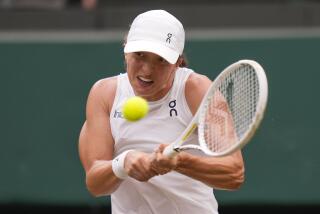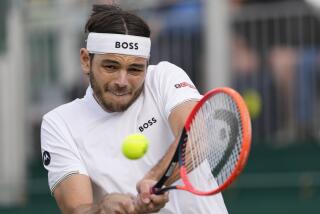TENNIS / JULIE CART : Skipping Doubles Could Help Her Singles
- Share via
WIMBLEDON, England — When Steffi Graf stiffed Martina Navratilova on the eve of their first-round doubles match, Navratilova was miffed. But few eyebrows were raised. When Murphy Jensen left his mixed doubles partner in the lurch, failing to show for their third-round match, the concern was more for why he did it rather than the fact that he did.
The lesson: Apart from the handful of specialists who regard doubles as their livelihood, doubles commitments are not taken seriously.
All of which made Jana Novotna’s comments after her semifinal match against Graf so unusual. Asked what more it would take for her to break through to win a Grand Slam event, Novotna thought for a while, then answered.
“I think what I would have to do would be that I wouldn’t have to play doubles,” she said. “If I want to be super-fit at the end of the tournament, or at the end of a championships, like here, I wouldn’t be able to play singles and doubles.
“The last two doubles matches we played here have taken us four hours, and it really is tiring. Instead of having your whole day off, you have to play two hours of doubles. It gets tiring and at the end, you really need every single [bit] of energy you can possibly have.”
Novotna pairs with Arantxa Sanchez Vicario, who prefers to play as much during a tournament as she can. Their doubles team was seeded No. 2 here.
What makes Novotna different is she believes that once she’s given her word to another player, she must not go back on it.
“I am prepared [to not play doubles] but it is also very difficult and it’s very unfair to your partner,” she said. “I would say, ‘OK, I’d like to play doubles at the French and in Australia, but I don’t want to play doubles at Wimbledon,’ which is not really fair to your partner because, if you make a commitment, you make a commitment for all the Grand Slams and most other tournaments.”
*
The bickering among the women over the return of Monica Seles should embarrass them, but they are too self-centered to notice. While the WTA Tour contemplates how Seles, ranked No. 1 when she left the tour two years ago, should be allowed to rejoin the tour, they are missing the bigger picture.
If the players had a strong union or players association, they would see that some players transcend the sport and, as unfair as it may appear, should receive different treatment. Basketball knows this, but tennis forgets.
Enlightened self interest should tell the players that Seles’ return will interest television, sponsors and fans, something the players have failed to do in Seles’ absence. There is an economic effect that would presumably trickle down to them too.
Additionally, the same players who are complaining that Seles might receive special consideration might well consider where their rankings and prize money might have been had Seles been playing at her previous level for the past two years.
*
It’s amazing what you can find out if only you ask. Apparently having run out of new questions to ask Graf, one reporter asked if she was a good dog trainer. Graf went along with it, divulging her philosophy about raising dogs.
“That’s something I don’t think you should do with dogs, is train them,” Graf said. “They should be natural.”
Graf wasn’t able to bring her two dogs to Wimbledon because of a six-month animal quarantine in England. She said that she misses her Labradors but has been feeding and playing with neighbor dogs at the house she’s renting in Wimbledon village.
*
Tennis’ built-in hierarchy comes to England and meets its equal in the All England Club’s class system. Tradition is strong at Wimbledon, democracy is weak.
Top players are the upper class and lower-ranked players are distinctly lower class. Seeded players have their own locker room, apart from the riff raff.
Guest passes and tickets are perks parceled out according to prestige, as Chanda Rubin found out last week. Rubin, from Lafayette, La., managed to get a guest pass for her mother, but the pass was only for the player’s tea room, not for the player’s box at matches or other parts of the grounds.
When Rubin went to Gate 2 to meet her mother at 10:15 one morning, the guards would not allow Bernadette Rubin in because her pass was not good until 10:30.
Rubin, a good-natured and soft-spoken person, explained to the guard that since she was there to pick up her mother, perhaps it would be OK to let her in rather than making them both wait for 15 minutes.
The guard refused.
The incident would have been viewed as simply a matter of following rules, were it not for a silly incident that happened at the French Open. Sanchez Vicario was able to obtain a laminated, fully-functioning credential for one of her dogs.
More to Read
Go beyond the scoreboard
Get the latest on L.A.'s teams in the daily Sports Report newsletter.
You may occasionally receive promotional content from the Los Angeles Times.











